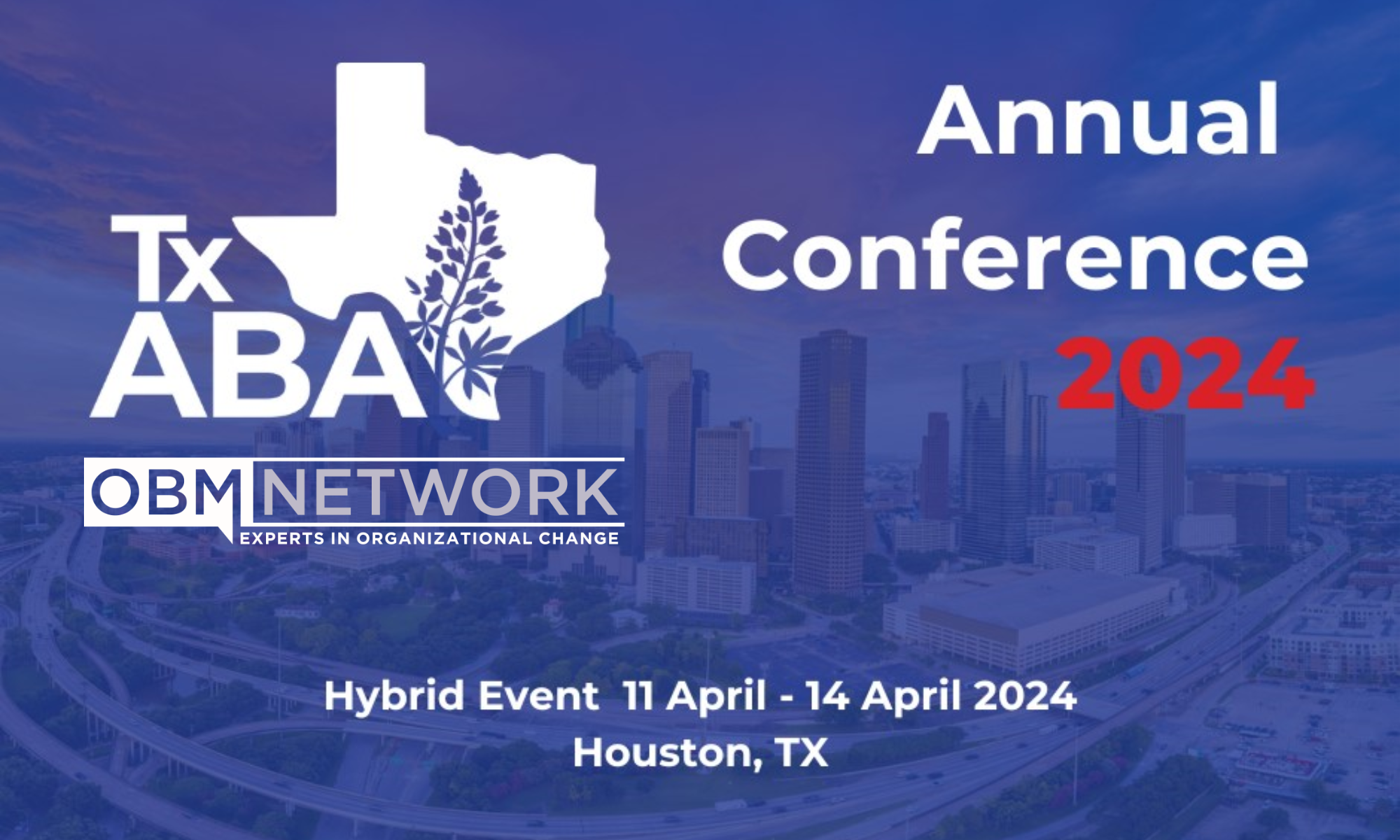
2024 Pre-Conference Workshops
General Information
When: Thursday, April 11, 2024
Where: Conference hotel Royal Sonesta (in-person)
Hybrid: Some workshops offer a live streaming option through Behavior Live, see individual workshop information below. Workshops are interactive, therefore they are not offered asynchronously after the conference.
TxABA Member Pre-Conference Workshop Registration and CEUs: $80 for 3-hr workshops and $150 for 6-hr workshops
The membership price for workshops will not appear on the purchasing page unless your membership is current. At this time, it is not possible to purchase a membership and get the member rate for workshops on the same transaction.
Non-Member Pre-Conference Workshop Registration and CEUs: $120 for 3-hr workshops and $225 for 6-hr workshops
We encourage those interested in attending a pre-conference workshop to register by March 1, 2024. We will review registration numbers in the beginning of March and low registration workshops may be canceled. On-site registration may be available if seats are still available and instructors have enough materials.
Please note that workshop instructors may promote their own books, curricula/materials, or services. Workshop registrants' names and email addresses will be shared with workshop instructors, you may receive emails from them before or after the workshop.
Can't decide between a TxABA pre-conference workshop and the OBM Network Conference? Great news! Registration for the OBM Network Conference includes access to the OBM Network Conference Keynotes and Workshops after the conference. You can attend a TxABA pre-conference workshop in-person or live-stream then catch the OBM Network Conference while relaxing at home over the next few months. Check out the OBM Network Conference here
Pre-Conference Workshop #1
The Texas Medicaid Autism Services Benefit: How to navigate the policy and process.

Instructors: Mariel Fernandez, MS, BCBA, LBA & Anna Sciarillo, MS, BCBA, LBA
Time: 9:00 am - 12:00 pm
Duration: 3 hours
BACB CEUs: 3 ETHICS CEUs Available
Hybrid Format: In-Person and Live-Stream
Abstract: This workshop will provide training on how to navigate the Autism Services benefit through Texas Medicaid, including the ethical considerations and responsibilities involved in providing Medicaid-funded services. Attendees will receive step-by-step guidance on the application and enrollment process, authorization process, and other program requirements as well as practice tools and strategies for overcoming common challenges and obstacles.
Learning Objectives:
- 1) Attendees will analyze the applicable Core Principles and Ethics Standards of the Ethics Code for Behavior Analysts in the context of Medicaid provision.
- 2) Attendees will describe how to submit their application through the Provider Enrollment and Management System (PEMS) for Texas Medicaid & Healthcare Partnership (TMHP) enrollment in order to adhere to regulatory compliance and professional conduct standards.
- 3) Attendees will identify the Managed Care Organization(MCO) in their service area, verify benefit information, and ensure that referring providers are Texas Medicaid enrolled in order to adhere to regulatory compliance and professional conduct standards
- 4) Attendees will advocate for appropriate services for clients by identifying key contacts and processes for resolving approval, contracting, credentialing, and authorization barriers.
- 5) Attendees will define medical necessity criteria and prior authorization requirements to obtain authorizations and maintain ongoing services in order to document professional activity and advocate for appropriate services for clients.
- 6) Attendees will explain the process to file complaints and appeals related to the Autism Services benefit as a way to advocate for appropriate services for clients.
Instructor Bios:
Mariel is a BCBA and a Licensed Behavior Analyst in Texas. She began working in the field of Behavior Analysis in 2001, while an undergraduate at Auburn University and became a BCBA in 2004. In 2007, Mariel helped to revise the Texas Administrative Code for the long-term home and community-based Medicaid waiver programs in Texas. She has worked with HCS, CLASS, TxHML, private insurance, Medicaid, TRICARE, HHSC CAP, General Revenue and Texas Workforce Commission Vocational Rehabilitation Funded programs. Mariel has extensive clinical, operations and compliance experience. She currently leads the Regulatory Affairs department at Blue Sprig Pediatrics, focusing on Advocacy, Public Policy, and Legislative initiatives across the country, including ensuring a clear understanding of the new Texas Medicaid benefit and smooth, or as smooth as possible, implementation of that benefit. She also serves as President of the Blue Sprig Pediatrics Advocacy Committee and Ethics Chair for the organization. Mariel is also a member of the Texas Department of Licensing and Regulation Behavior Analyst Advisory Board, Co-Chair of the Metro-Care Services Public Advisory Committee, President of the TXABA Public Policy Group. She served as a subject matter expert for the Policy Council on Children and Families, specific to the Autism Services benefit through Texas Medicaid.
Anna Sciarillo is a BCBA in San Antonio, Texas, currently working at Empower Behavioral Health as the Vice President of Intake and Marketing. Anna began her career in the field of ABA in 2010 and has experience with clinic-based, in-home, and community-based treatment. Anna received her bachelor’s degree from Louisiana State University and her master’s in special education with an emphasis in ABA from The University of Texas at San Antonio. Anna serves as the Secretary for the Texas Association for Applied Behavior Analysis Public Policy Group (TxABA PPG). She also serves as Chair of the TxABA PPG Medicaid Task Force.
Pre-Conference Workshop #2
Efficiently Searching the Online Databases

Instructor: Nicole Bank, Ph.D., BCBA, LBA
Time: 2:00 pm - 5:00 pm
Duration: 3 hours
BACB CEUs: 3 CEUs Available
Format: In-Person
Abstract: Professional behavior analysts should maintain contact with research and developments from the discipline. Many regulatory organizations indicate this is a requirement in the profession. For example, the Behavior Analyst Certification Board’s Ethics Code suggests, “Behavior analysts actively engage in professional development activities to maintain and further their professional competence.” This workshop will cover how the academic literature is organized, which resources are available to Board Certified Behavior Analysts, how to interact with the various research resources available, and how to efficiently search for behavior analytic concepts and terms. This workshop involves lecture, demonstration, and practice activities.
Learning Objectives:
- 1) Describe three reasons a BCBA should stay in contact with the scholarly literature
- 2) Explain how academic research is organized online
- 3) List common barriers to research for professional behavior analysts
- 4) List literature resources available to BCBAs
- 5) Use the advanced search option and build an efficient literature search
Instructor Bio:
Nicole is a BCBA and Licensed Behavior Analyst in Texas. She has a PhD in Library and Information Science with an emphasis in scholarly communication and a minor in Behavior Analysis. She owns and operates CurrentABA, an online resource designed to help professional behavior analysts learn about research developments in the field and find free full text copies. Her primary research interest is the research literacy of professional behavior analysts; however, reading the research often prompts research projects at the bottom of other miscellaneous rabbit holes.
Pre-Conference Workshop #3 has been cancelled.
If you registered for this workshop already then TxABA staff will reach out to you to offer transferring to another workshop or provide a full refund
Pre-Conference Workshop #4
Effective Leaders Do What It Takes! Organizational Performance Engineering for Provider, Parent, and Client Success

Instructor: Guy Bruce, Ed.D., BCBA-D
Time: 9:00 am - 12:00 pm and 2:00 pm - 5:00 pm
Duration: 6 hours
BACB CEUs: 6 SUPERVISION CEUs Available
Hybrid Format: In-Person and Live Stream
Click Here for a 45 second video of Dr. Bruce talking about Progress Charter on YouTube
Abstract:We can use an organizational performance engineering process to change how providers work together so that every learner makes efficient progress towards mastery of the knowledge and skills needed for a successful life. The EARS process has four steps: 1) Evaluate learner progress; 2) Analyze provider performance problems; 3) Recommend changes in provider resources, training, and management; 4) Solve provider performance problems by designing and implementing recommended solutions. We evaluate learner progress to identify as soon as possible when a learner is not making efficient progress towards mastery. That requires frequent, accurate, sensitive measures of learner behavior change. We analyze provider performance problems to identify their causes, which may include inadequate resources, training, or management. A useful analysis requires accurate, direct measures to identify design and implementation flaws in provider evaluation, learning, and management resources. A student may not learn because her teacher has inadequate resources, training, or management. Her teacher's performance problems are caused by supervisor, staff trainer, program designer and/or director performance problems. Their performance problems are also caused by inadequate resources, training, and management. We recommend changes in teacher, supervisor, staff trainer, and director resources, training, and management based on the findings of our analysis of provider performance problems. Then we solve organizational performance problems by designing and implementing recommended solutions. Organizations fall apart which is why they fail to achieve their missions. We can design and implement an Organizational Performance Engineering process to fix them. Workshop activities include presentation and discussion of a case study that illustrates how we used the EARS process to improve the organizational performance of a preschool for children with autism, a user handbook that describes each step in the process in more detail, a workbook with practice exercises for each step in the EARS process, and free subscriptions to ProgressCharter, a software application that will make it easier to design and implement the EARS process of organizational performance engineering.
Learning Objectives:
- 1) Given examples of pragmatism and dogmatism, say the names of each example.
- 2) Describe the benefits of a pragmatic approach to the science and engineering of behavior change.
- 3) Name the functions and describe the relationships in the Provider-Recipient Network.
- 4) Evaluate client progress using frequent, accurate sensitive measures of behavior change.
- 5) Analyze provider performance problems to identify their useful causes.
- 6) Recommend changes in provider resources, training, and management based on a data-based analysis of provider performance problems.
- 7) Solve provider performance problems by designing and implementing recommended changes in provider resources, training, and management.
Instructor Bio:
Since earning his Ed. D. in Educational Psychology from the Behavior Analysis in Human Resources program at West Virginia University, Dr. Bruce has taught behavior analysis in both undergraduate and graduate programs and consulted with variety of organizations, including BellSouth, Crystal River Nuclear Power, Delta Faucet, Dearborn Financial, Mayo Hospital, and Waddell & Reid Financial Services. He is the author of “Instructional Design Made Easy,” a workbook for designing more efficient training programs and EARS, a data-based, performance-engineering process that can be used to improve organizational performance at the system, process, and individual levels, so that organizations can achieve desired results. In addition to conducting workshops on the application of organizational performance engineering to change how providers work together, so that every client or student makes efficient progress, he is currently working on ProgressCharter, a mobile/web application that will facilitate implementation of the EARS Process: Evaluate Student Progress, Analyze Provider Performance Problems, Recommend Changes in Provider Resources, Training, and Management, and Solve Provider Performance Problems by Designing and Implementing Recommended Solutions
Pre-Conference Workshop #5
An ABA Innovators Workshop: Navigating Entrepreneurship and Intrapreneurship for Sustainable Growth and Ethical Excellence

Instructors: Isaac L. Bermudez, MS, BCBA, Brett DiNovi, BCBA, Laura Iglesias BCBA, and Billy Brown, BCBA
Time: 9:00 am - 12:00 pm and 2:00 pm - 5:00 pm
Duration: 6 hours
BACB CEUs: 3 SUPERVISION CEUs and 3 ETHICS CEUs Available
Hybrid Format: In-Person and Live Stream
Abstract: This dynamic workshop delves into the world of entrepreneurship and intrapreneurship within Applied Behavior Analysis (ABA) organizations, offering a holistic perspective on fostering innovation and sustainable growth. Participants will explore the multifaceted landscape of ABA through the lens of the “5 Laws of Life and Leadership (DiNovi & Gavoni, 2021)” and gain actionable insights for entrepreneurial success within this field. The workshop will provide an essential overview of entrepreneurship and intrapreneurship, highlighting their significance in the context of ABA organizations. Participants will gain a deep understanding of the distinct roles and opportunities for both entrepreneurs and intrapreneurs within the ABA industry. Building on this foundation, the workshop offers practical tips and strategies tailored to ABA professionals aspiring to embark on entrepreneurial journeys or drive innovation within existing organizations. Participants will learn how to navigate the unique challenges and opportunities in this specialized sector. In today’s data-driven world, intelligence gathering and informed decision-making are paramount. This workshop equips attendees with essential skills for gathering intelligence relevant to their ABA businesses and leveraging data to make well-informed strategic decisions. Furthermore, participants will gain insights into financial aspects of running ABA organizations, with a focus on sustainability. Analyzing financials and implementing effective financial management practices will be explored to ensure long-term viability and growth. The workshop also emphasizes the importance of building and maintaining clinical standards in ABA organizations, ensuring quality service delivery while adapting to industry changes and client needs. Strategies for crafting and maintaining effective clinical standards will be discussed. Lastly, the workshop addresses the ethical dimensions of entrepreneurship in the ABA domain, guiding participants in building businesses that align with strong ethical principles. Attendees will explore ethical considerations specific to ABA and learn how to establish an ethical foundation for their enterprises. By the end of this workshop, participants will be equipped with a comprehensive toolkit to navigate the dynamic world of entrepreneurship and intrapreneurship within ABA organizations, ensuring they are well-prepared to drive innovation, make data-driven decisions, maintain financial sustainability, uphold clinical standards, and foster ethical business practices in this vital field.
Learning Objectives:
- 1) Participants will be able to distinguish between the roles for both entrepreneurs and intrapreneurs and name 1-2 opportunities within the ABA industry.
- 2) Participants will identify 1-2 ways to navigate the unique challenges and opportunities within ABA service delivery
- 3) Participants will be equipped with the essential skills for gathering intelligence and creating 1-2 ways of establishing visibility relevant to their ABA businesses or roles within their organization.
- 4) Participants will pinpoint 1-2 financial aspects of running their ABA organizations, so they can analyze basic financial information as a part of good financial management practices.
- 5)Participants will identify 1-2 ways of building and maintaining clinical standards in their organization or their practice and how to adapt to industry changes and client needs.
- 6) Participants will identify how to navigate 1-2 ethical dilemmas of entrepreneurship and intrapreneurship in their organization and how to align their practice with strong ethical principles.
- 7) Participants will learn and practice how to pinpoint behaviors, goal set, self monitor and report out, and provide reciprocal feedback within a pay for performance model
Instructor Bios:
Isaac is the Chief Innovation Officer of Brett DiNovi & Associates (BDA) and the Vice President of the California region. Isaac has been providing services in applied behavior analysis (ABA) since 1998. He has worked in executive leadership positions in the behavior health industry for the last 18 years and uses the principles of organizational behavior management (OBM) to guide the support and growth of organizations. Over the last 15 years, Isaac has led ABA departments, started companies, and has grown organizations over 500% while earning awards for quality of service and employee satisfaction. In addition to Isaac's primary role at BDA, he is an invited speaker for state and national conferences as well as has co-authored articles and chapters, most recently in the textbook on Multiculturalism in Applied Behavior Analysis. Isaac is the co-founder of the Latino Association for Behavior Analysis (LABA) as well as a mentorship program called Mentorologist, which has a dedicated Youtube channel that bears the same name. Finally, Isaac is developing a performance management app called Smash My Goal that will be available in early 2024 on iOS and Android.
Brett DiNovi is a Board Certified Behavior Analyst & the CEO of the largest award winning behavioral consulting/OBM group of its kind on the East Coast of the United States. Brett DiNovi & Associates (BDA) deploys over 600 consultants in more than 300 schools/organizations serving NJ, NY, DE, PA, ME, FL, California, & internationally through the use of remote video consultation. Brett is also a best selling author with his new book Behavioral Karma. Brett is also the co-founder of the B.F. Skinner Institute which disseminates behavioral science worldwide. He has the unique & distinguished experience of studying the principles of applied behavior analysis under the rigorous scrutiny of both Dr. Julie S. Vargas (formerly Skinner) and Dr. E.A. Vargas at West Virginia University's internationally recognized program. For the past 30 years, Brett has used behavior analytic principles to create large-scale change across businesses using the principles of organizational behavior management (OBM). Brett has been a business consultant in Morgantown WV, an instructor at West Virginia University, a guest lecturer at numerous universities, a world class keynote speaker, an expert witness in due process hearings, a contributing writer for online blogs, has publications in the Journal of Applied Behavior Analysis, & has been in executive leadership positions across schools and residential programs nationwide. In addition to an award from South Jersey Biz Magazine for "Best Places to Work", an award for "Best of Families" in Suburban Magazine, the distinguished "Top Ranked U.S. Executives" award, state of NJ Senator's award, Brett's proudest accomplishment is being a role model & father of his daughter & two step children one of whom is on the autism spectrum.
Laura Iglesias is the Vice President of Brett DiNovi and Associates Texas. She started working with children with Autism and Developmental Disabilities in 2005, as she completed her Bachelor's degree in Psychology. As she grew to love the field of Applied Behavior Analysis, Laura received her Masters degree in Special Education Teaching and Applied Behavior Analysis and became a BCBA in 2014. Over the years, Laura has worked directly with families, clients and staff in the home, school and clinic settings. Laura has a passion for Natural Environmental Teaching and helping clients and their families reach their goals. She has a solid sense of teamwork and organization skills which leads to a hands-on and collaborative approach to training and working with staff and families.
Billy Brown is an accomplished professional with over 7 years of dedicated service at Brett DiNovi & Associates (BDA), he has had the privilege to grow and contribute significantly to this dynamic organization. His journey at BDA has been marked by progressive leadership roles, reflecting my commitment to driving positive change through the application of Organizational Behavior Management (OBM). In his current role as Chief Information Officer (CIO), he has the distinct responsibility of overseeing the organization's information technology strategies and ensuring seamless integration with our OBM initiatives. By leveraging cutting-edge technology solutions, he work closely with our team to enhance data analytics, streamline processes, and facilitate evidence-based decision-making. This role has allowed me to bridge the gap between behavioral science and technology, unlocking new avenues for improving organizational performance. Prior to his CIO role, he served as Vice President of Organizational Behavior Management and Executive Director of School Consultation at BDA, where he led transformative initiatives that leveraged OBM principles to elevate organizational and educational outcomes. His journey at BDA began as a Behavior Consultant, where he honed his skills in behavior analysis, coaching, and intervention strategies. His educational background, with a Master of Arts in Applied Psychology from Rider University and a Bachelor of Arts in Psychology from Rowan University, has provided him with a strong foundation in psychological principles and their practical application in real-world scenarios. As he continues to champion the principles of OBM, bridge the gap between technology and behavior science, and strive for excellence in his field, he is excited about the possibilities for creating positive change and driving success for individuals and organizations. He welcomes connections with like-minded professionals, opportunities for collaboration, and discussions on how we can collectively advance the field of Organizational Behavior Management.
Pre-Conference Workshop #6
Behavioral Relaxation Training: Third Wave Intervention for the Management of Stress, Anger, and Aggression in Special Populations

Instructor: John Guercio, Ph.D., BCBA-D, CBIST
Time: 9:00 am - 12:00 pm
Duration: 3 hours
BACB CEUs: 3 CEUs Available
Format: In-Person
Abstract:This training will cover the incorporation of Behavioral Relaxation Training as it applies to the assessment and training of relaxed behavior. This training will be compared with mindfulness and other stress reduction techniques with respect to efficacy, evidence base, and clinical outcomes. The Behavioral Relaxation Scale (BRS) will also be covered along with a tutorial on scoring with the BRS and determination of which areas of relaxed behavior need to be targeted. The role of multi-modal assessment will be presented in the context of BRT as it compares to Progressive Muscle Relaxation (PMR), mindfulness training, and a host of other relaxation and stress reduction techniques.
Learning Objectives:
- 1) Participants will select different measures of relaxation and the form that they have taken as they have been introduced historically
- 2) Participants will identify the role of observational, motoric, and other modalities as they apply to relaxed behavior
- 3) Participants will match the areas of the Behavioral Relaxation Scale (BRS) as they apply to assessing relaxed behavior
Instructor Bio:
Dr. Guercio has spent much of his career researching effective staff training protocols and behavior intervention strategies for staff and clients in treatment settings for clients with severe aggression. Since obtaining his master’s and doctoral degrees in behavior analysis and therapy from Southern Illinois University at Carbondale, Dr. Guercio has worked in settings serving as Director of Behavioral Services for the Missouri Department of Mental Health, and as Vice President of Clinical Services and Research at the Judevine Center for Autism/TouchPoint Autism Services in St. Louis. He also serves as adjunct faculty in the behavior analysis department at Washington University and St. Louis University. He has also given more than 500 presentations at behavioral conferences and authored and/or co-authored over 60 articles in peer reviewed journals as well as written several book chapters related to the treatment of intensive behavioral issues. He has authored or co-authored 4 books; Assessment of Adult Core Competencies: Teaching Skills to Adults with Autism and Severe Behavioral Challenges; Behavioral Relaxation Training Clinical Applications with Diverse Populations; PAADS; Protocols for Adolescents and Adults with Severe Disabilities in the Transition to Adulthood; and A History of the Behavioral Sciences: Theoretical Underpinnings and Historical Development. Dr. Guercio serves on the Board of Editors of Behavior Analysis Research and Practice; Behavior Analysis and Practice; Advances in Neurodevelopmental Disorders, and a reviewer for the Journal of Applied Behavior Analysis and Research in Developmental Disabilities. In his career, Dr. Guercio has helped design and run a program for individuals with sexually deviant behavior and substance abuse issues and has developed an entire treatment protocol based upon that program. In his current role at Benchmark Human Services, Dr. Guercio serves as the Clinical Director. He oversees the continuing education and clinical consistency across the behavior analysts across all the 20 states that Benchmark does business in. He develops and delivers behavioral services for clients with significant aggression and high-risk behavioral needs, many of whom have been institutionalized in forensic settings for more than 20 years, often under mechanical restraints and heavy medication. Through Dr. Guercio’s leadership, many clients’ have achieved higher levels of autonomy and become more active participants in their communities. Dr. Guercio currently serves on the ABAI Licensing Committee and is a board member of the Missouri Association for Behavior Analysis.
